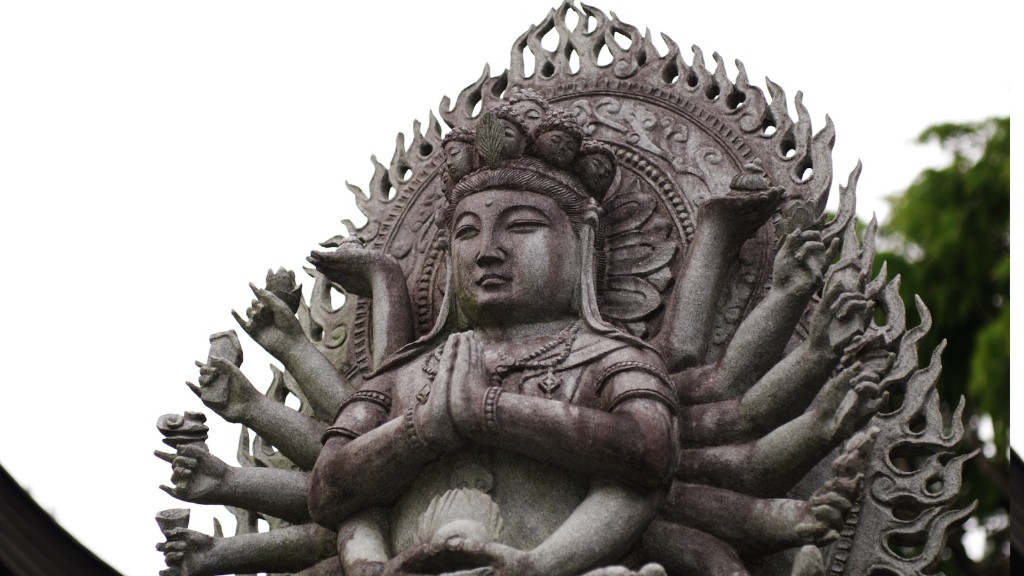Buddhism is one of the world’s oldest religions, with over 500 million followers worldwide. It was founded by Siddhartha Gautama, also known as the Buddha, in the 5th century BCE in India. The Buddha’s teachings, known as the Dharma, emphasize compassion, self-awareness, and non-attachment. Buddhism is a major religion in many countries, including China, Tibet, Japan, and Thailand.
Buddhism is a religion and philosophy founded in India by Siddhartha Gautama in the 5th century BCE. It is based on his teachings, known as the Dharma, and is the fourth-largest religion in the world, with over 500 million followers. Buddhism teaches that the truth of the Dharma can only be attained through one’s own experience, and that it can be accessed through meditation and ethical living.
What is Buddhism in simple terms?
Buddhism is a religion that teaches that the human life is one of suffering, and that meditation, spiritual and physical labor, and good behavior are the ways to achieve enlightenment, or nirvana. Buddhism is one of the world’s largest religions, with over 500 million followers worldwide. Buddhism originated in India over 2,500 years ago, and has since spread to countries all over the world.
Buddhism teaches that after we die, our consciousness is reborn into another body. This cycle of birth, death and rebirth is called reincarnation. However, Buddhists do not believe in the concept of a soul being reborn into another body. Instead, they believe that it is our consciousness that is reborn.
What are the 3 main beliefs of Buddhism
Buddhism is a religion that teaches that all beings are interconnected and that actions have consequences in the cycle of rebirth. The main principles of Buddhism are karma, rebirth, and impermanence.
Buddhism is a religion that does not include the belief in a creator deity, or any eternal divine personal being. This means that Buddhists do not believe in a God who created and oversees the universe. Instead, Buddhists believe in a cycle of birth, death, and rebirth.
What is Buddhism vs Christianity?
There are inherent and fundamental differences between Buddhism and Christianity. One significant element is that Christianity is monotheistic and relies on a God as a Creator, while Buddhism is generally non-theistic and rejects the notion of a Creator God. This difference provides different values for the world.
The Middle Way is the Buddhist way of life; a self-development progression through the Noble Eight-fold Path which comprises Right Understanding, Right Thought, Right Speech, Right Action, Right Livelihood, Right Effort, Right Mindfulness and Right Concentration. The Middle Way is often described as the path of moderation, avoiding extremes of self-indulgence and self-mortification.
How do Buddhists worship?
Buddhists worship at temples or monasteries as a sign of respect to the Buddha. They believe that by doing so, they are able to make merit for themselves. Burning incense and offering fresh flowers, lights, and lamps are all ways in which Buddhists show their respect.
Buddhism is a religion that does not believe in a unique creator god. It instead believes in a number of long-lived gods, but sees ultimate reality, Nirvana, as beyond these gods. This makes it a kind of trans-polytheism.
What can a Buddhist not do
Buddhists live by five moral precepts which are called the Five Precepts. These precepts prohibit killing living things, taking what is not given, sexual misconduct, lying and using drugs or alcohol. The aim of the Five Precepts is to promote good character and to prevent harmful behaviours.
Buddhism teaches that drinking or using other drugs can cause carelessness and should be avoided, and strong Buddhist beliefs would be expected to have a significant impact on alcohol use. Buddhism also teaches that alcohol can lead to cravings and should be avoided if one is trying to stay on the path to enlightenment.
Does Buddhism believe in karma?
For Buddhists, karma has implications beyond this life. Bad actions in a previous life can follow a person into their next life and cause bad effects (which Westerners are more likely to interpret as ‘bad luck’). Even an Enlightened One is not exempt from the effects of past karma.
It is generally believed by Buddhists that life and death are part of a continuum, and that consciousness (or the spirit) continues on after death and may be reborn. Death, then, can be seen as an opportunity for liberation from the cycle of life, death and rebirth.
Is A Buddhist an atheist
Buddhism is not a theistic religion, meaning that it does not believe in a creator god. The Buddha himself rejected the idea of a creator god, and Buddhist philosophers have even argued that belief in an eternal god is nothing but a distraction for humans seeking enlightenment. However, this does not mean that Buddhism is averse to theistic religions. In fact, many Buddhists see theism as a helpful way to focus on the Buddha’s teachings.
Buddhists believe that Jesus is an enlightened being who came to our planet to help us achieve nirvana. They see Christmas as a time to reflect on his teachings and to practice compassion and loving-kindness. While Buddhists do not celebrate Christmas in the same way as Christians, they still honor the holiday and its importance.
Do Buddhists believe in heaven?
Buddhism teaches that there is no concept of punishment or reward, and that there is no divine being who decides who goes to hell or heaven. There is merely the illusory results of our thought, words and deeds, which we call karma.
Christians and Buddhists have very different beliefs when it comes to God, creation and salvation. Christians believe in one God who created the world and offers salvation to those who believe in him. Buddhists, on the other hand, believe in reincarnation and enlightenment. They believe that each person has the potential to achieve nirvana, a state of perfect peace and bliss. Because of these fundamental differences, it is difficult to see how the two belief systems could be compatible.
What do Buddhists pray for
When we pray to buddhas, bodhisattvas, and spiritual masters, we are invoking the enlightened qualities of our own heart and mind. By letting go of the ego’s resistance to humility, we can open ourselves up to these higher states of consciousness. Through prayer, we can connect with our true nature and receive guidance and inspiration on our path to enlightenment.
The Dhammasangani is a Buddhist scripture that enumerates the various tenets of the Buddhist faith. Among the many things it discusses, the Dhammasangani specifically names five acts that it regards as unpardonable sin: matricide, parricide, slaying an Arhat, slaying a Buddha, and causing division among priesthood. These five acts are considered to be so grave that they are beyond the pale of forgiveness. As such, anyone who commits any of them is deserving of the most severe punishment.
Final Words
Buddhism is a religion that originated in India. It is based on the teachings of Siddhartha Gautama, who is also known as the Buddha. The Buddha is believed to have attained enlightenment through his own effort and teachings. Buddhism teaches that the way to end suffering is through the Four Noble Truths and the Eightfold Path. These noble truths are that suffering exists, that suffering has a cause, that suffering can be ended, and that there is a path to the end of suffering. The eightfold path is a path of ethical and moral conduct that includes right understanding, right thought, right speech, right action, right livelihood, right effort, right mindfulness, and right concentration.
Buddhism is a religion and philosophy that began in India with Siddhartha Gautama, also known as the Buddha, around the 5th century BCE. With around 500 million followers, Buddhism is the fourth largest religion in the world. Buddhism teaches that the way to end suffering is to end desire and attachments. To do this, Buddhists practice mindfulness and meditation.


